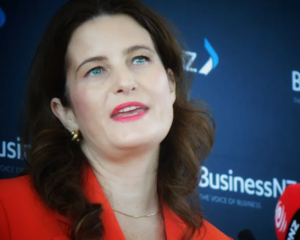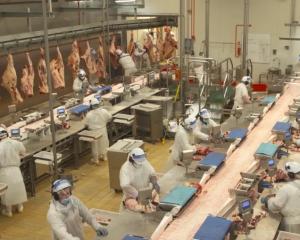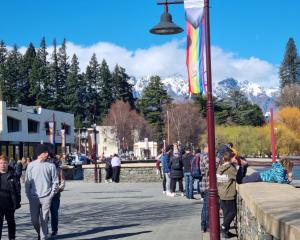

As co-owner and chief executive of Dunedin advanced manufacturing business United Machinists, she was patently aware she was a minority.
"You can probably name on two hands female manufacturing or engineering company owners in New Zealand."
"It helps to stand out, I don’t mind standing out. As a woman in business, if you’re comfortable doing it, I think we have a bit of a responsibility to stand out as well," she said.
Not enough women were role-modelling leadership positions in predominantly male-dominated industries to girls coming through or other women in the workforce keen for a change of career, she believed.
And while Mrs Ramsay was aware of New Zealand’s oft-cited Tall Poppy Syndrome, "I’ll keep doing it because I think it’s great. Hopefully there’ll be a time I won’t be so unusual".
She acknowledged that being a young, female engineering business owner had also helped boost the company’s profile and get its story told, coupled with the skills at the business.
"We’ve been given that platform and we’ve taken full advantage of it," she said.
What had been nice over the past couple of years was the increasing number of women contacting Mrs Ramsay and wanting to work together.
Previously, as she was coming up through the ranks of her career, the biggest pushbacks were from other women, not men, she said.
Not only a passionate advocate for advanced manufacturing, Mrs Ramsay also repeatedly flies the flag for Dunedin, the city she moved to when she was 13 before leaving at 17 for an eight-year stint in Sydney.
She later moved back to Dunedin, where she launched Immersion Marketing, in 2010.
Eight years later, she had a desire to scale up a business.
Not easy to scale up that type of business, she made the decision to close the door.
What was initially to be a six-month stint at United, her husband Alex’s family business which the couple bought from his parents Doug and Lesley in 2016, turned into much more.
She discovered it was such an "incredibly interesting" industry and she saw United double in size.
"I found from day one this fascination with how did I not know how stuff got made?"
That had been a driving force for both her and her husband, how people walked around each day, caught buses and flights, got to school, yet had no concept of the craftsmanship, skill and technology that went into making that happen.
She felt very privileged to be involved in a business that helped make those things, and increasingly things like satellites, rockets and medical instruments.
Now her job was meeting owners, chief executives and chief operating officers of some "really incredible" business in New Zealand, now Australia and hopefully United States companies next year, to help them to "make stuff".
Mrs Ramsay described 2023 as a year of extreme highs and extreme lows — "it’s been completely unpredictable".
While it had been probably the toughest year of running United, there had also been many highlights including exporting for the first time, some new clients in the space and medical areas and on-boarding new technology.
"For Alex and I, it’s really proven to us we’re in the right game and we want to keep growing. It’s really been a year we realised we are on to something special."
From an industry perspective, it was the first time in the six years she had been involved in the business that there had been a really collaborative community nationally.
United had always collaborated locally, including with other engineering firms, and also nationally.
When it found itself light in work, it would put the word out and be sent work to do, and vice-versa.
Coupled with the Advanced Manufacturing Industry Transformation Plan, the Southland Otago Regional Engineering Collective (SOREC) — established in 2019 with the objective of improving resilience and growing the manufacturing engineering sector through the attraction of more apprentices, supporting business transformation and promoting regional capability — and Advanced Manufacturing Aotearoa (AMA), a new cross-sector incorporated society representing manufacturing business across the country, the network nationally was "massive".
Mrs Ramsay had people from all sectors reach out, from direct competitors to those in the textile, horticulture and food and beverage industries, asking how to get involved and how to support the manufacturing industry to keep that voice going forward.
There was a real realisation that manufacturing was critical for "helping solve the productivity piece".
"If there continues to be a lot of disparate groups, we’re never going to get there," she said.
The only way to get better, whether that was labour, policy conditions, capital investment and supply chains, was to work together.
That movement was quite pronounced at the moment; having a minister of manufacturing and also National’s space policy felt like things were "going in the right direction".
There was also a lot of sharing of information between companies, having been through a lot over the last three years, over the likes of cash flow, labour force, enterprise resource planning and increasing automation and robotics.
"Lots of companies are taking notes and working together."
What had changed in the last six years was how they were now talking about manufacturing partnerships.
Those they were working with did not have a "design god complex"; they had full respect for the manufacturing process.
Six years ago, generally machine shops were seen as the "dirty end of the process".
Now they were seen as a key capability partner and it had been great to watch that transition.
It was also rewarding to see her husband and the United staff get the recognition that they deserved from clients.
For Mrs Ramsay personally, there was the issue of burnout — "quite royally" as she says openly — in the middle of the year.
While she had always been reasonably good at delegating and coaching people, she acknowledged her personal skill set was not in day-to-day operational management.

Work at United Machinists on redoing the operational flow this year had been transformational, not just in productivity but in everybody’s enjoyment of their roles.
As a leader, a perfectionist and a workaholic, she acknowledged now she needed to do more fun stuff. And exercise had been key to address that burnout.
That had been a hobby rather than a chore, whether it was surfing, biking, the lure of the loud music at a pump class, running, or a once or twice-weekly walk along the beach with a girlfriend.
Writing had also been a creative outlet and she was enjoying advocacy — particularly around Advanced Manufacturing Aotearoa, where she is chairwoman of AMA’s council — and learning about policies on a national level.
The more she filled her life up with fun and intellectual stimulation, the more she enjoyed work and the less stressed she was.
It was about finding that balance.
The biggest priority always was 8-year-old son Fin.
Having him had been the "best thing ever".
"He’s kind, friendly, sporty, outgoing and happy."
Asked how it worked working alongside her husband, she laughed and said they still butted heads occasionally.
Mr Ramsay, a keen musician, was much more the craftsman and not as much a workaholic as his wife.
He brought inspiration to the team around how good he was at design processes and machining and would always be the leader in the most technical jobs.
At the beginning, they worried the team might find it awkward.
But the team loved seeing them happy.
"It’s like Mum and Dad, if Mum and Dad are not happy with each other, everyone’s feeling a bit uncomfortable."
Both were very attuned to their team and where their employees’ strengths were and many of their conversations were about where the next opportunity was for that person.
Mrs Ramsay was unashamedly passionate about Dunedin.
It was a standing joke that when she was overseas for trade shows and people had no idea where it was, that she said it was a "very quiet, top-secret location".
The community had been a huge support, not just for her but also for others.
"It’s really important to be enjoying your life so you can bring your best self to work.
"Dunedin really is an enjoyable place to be living.
"The liveability of the city generally creates happy people, we can see that in our team at work."
The city’s business community was small enough to be a village but large enough to be "pretty powerful" on a national scale.
There was a "kind of underdog current" that went through Dunedin and when Dunedinites were travelling and away, they promoted one another and worked together.
A good example of that was the NZ Hi-Tech Awards Trust meeting in Dunedin in April.
More than 160 people attended the city’s first NZ Hi-Tech Awards event, hosted on-site by United Machinists, where they were surrounded by autonomous machines manufacturing everything from prosthetics to aerospace components.
It was the largest launch party in the country and those attending were "just blown away".
Next year’s launch would be held at Animation Research.
Many other regions were struggling with the cohesion and collaboration Dunedin had.
SOREC was a good example, she said.
There was a lot of talk about New Zealand being somewhat of a pilot case and sample market on the global stage and she believed Dunedin could be used as that on a national level.
Early-stage companies had been another long-standing interest and Mrs Ramsay was previously chairwoman of Mainland Angel Investors and Startup Dunedin.
So what is on the agenda for next year?
United was heading to the United States to have a crack at the aerospace market and it was also focused on the Australian medical market.
It was heading into Christmas with the most forward work it had ever had at this time of year.
That was coming off the back off the biggest quarter ever.
Mrs Ramsay was excited about hopefully more certainty, which meant she could hire more staff, including a new 2IC.
The business would be investing "around the edges"; an anodising plant — the most advanced in New Zealand — and a metal 3-D printer would get up and running.
United would also be pursuing AS9100 aerospace accreditation.
Next year, she believed would also be the year the capability at United really outstripped her and her husband’s knowledge and she believed there would also be a lot more export.
United, which has 22 staff, would start on the growth path again but it was being deliberate about that growth.
After three years of "chaos", time would be put aside to figure out "what we want to be when we grow up" from a company perspective, and what the plan for the next 10 to 15 years was.
There were some non-negotiables and both Ramsays still wanted to be in the business and based in Dunedin.
"We don’t want to grow a business that becomes a rod for our and our team’s back.
"We want to be cautious about how big we want to get.
"It’s about what is an enduring and sustainable size and just a level of what we can realistically do from Dunedin."











